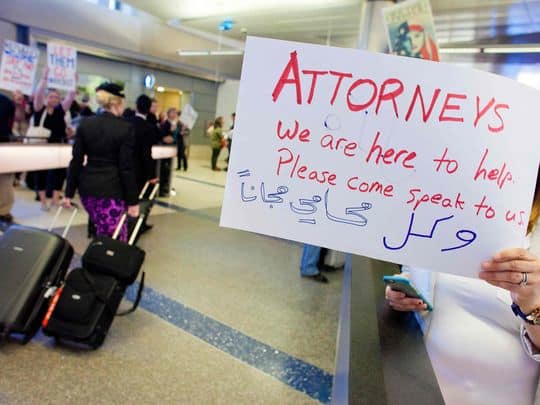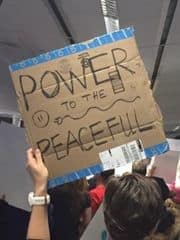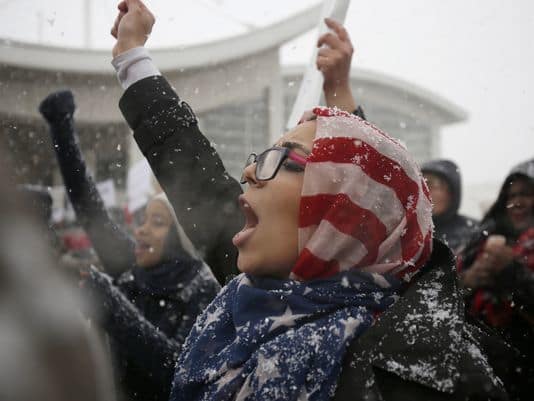The White House is vigorously defending President Donald Trump’s immigration restrictions, as protests spread throughout the country. (Jan. 30) AP
SAN FRANCISCO — When Mahboud Zabetian got word that a presidential ban on immigrants from seven majority-Muslim countries had gone into effect this past weekend, his reaction was immediate.
“We’re on a slippery slope,” warns Zabetian, a senior software engineer at YouTube who is a naturalized U.S. citizen. He came to this country in 1983 as a 16-year-old Iranian refugee seeking political asylum.
“We need to stop this (travel ban) before it escalates,” Zabetian says. “We’re not far from talk of internment camps, I fear. It’s not a time to be shy and reserved.”
Protesters in several U.S. cities agreed, staging demonstrations that continued Monday. Recently, Trump administration officials said the ban would be amended to not impact those holding green cards from the affected countries.
That concession did nothing to allay the fears of another foreign-born engineer.
For the first time, the U.S. “is not home anymore,” Ali Khodaei said in a LinkedIn post, commenting on a travel restriction on countries that include Iran. “I felt scared, I felt confused, I felt lonely. My friends and family are scared and helpless.”
Khodaei, an Iranian-American who has worked as an engineer and scientist at Microsoft and is now senior product manager at LinkedIn, could not be reached for further comment.
But others took to the Internet to express their frustrations and fears.

Volunteer lawyers hold signs offering help to people at Los Angeles International Airport following President Trump’s executive order banning citizens from seven predominantly Muslim countries from entering the U.S. (Photo: Konrad Fiedler, AFP/Getty Images)
“I believe that with this Executive Order (on immigration), our President has reverted to the short game,” Dara Khosrowshahi, an Iranian refugee who is CEO of online travel service Expedia, told employees in an internal email first reported by GeekWire.
“The U.S. may be an ever so slightly less dangerous as a place to live, but it will certainly be seen as a smaller nation, one that is inward-looking versus forward thinking, reactionary versus visionary,” he said.
The concerns of Zabetian, Khodaei and Khosrowshahi and others deepened Monday, with a Bloomberg report that the Trump administration is preparing an executive order that would take a sledgehammer to work-visa programs[1] that supply tech companies with tens of thousands of workers annually.
The expected order — which would require companies to hire Americans first — could force Apple, Amazon, Google and other tech companies to overhaul how they recruit skilled labor. Tech giants have leaned on the H-1B program, they say, because of a shortage of highly-skilled workers in the U.S.
To disrupt a key element of the recruitment process would “create a similar chaos to the travel ban” for tech as well as universities, hospitals and biotech, says immigration lawyer Sam Adair. Applications for such visas this year begin April 1.
In his daily briefing with reporters, White House press secretary Sean Spicer on Monday said an action on H-1B is “part of a larger immigration effort.”
A fractured relationship
The summit that then-President-elect Donald Trump hosted last month with a dozen tech executives seems like a distant memory.
Trump deemed it a productive meeting but the travel ban prompted overt condemnation from tech executives at Google, Apple, Microsoft, Airbnb and more. Google co-founder Sergey Brin, who is Russian, was at a protest at San Francisco International Airport on Saturday night.
LinkedIn said it was hastening previous plans to expand its refugee program to include refugees already residing in the U.S. And Box CEO Aaron Levie is helping organize an “anti”-immigration-ban project.

Sign of a San Francisco demonstrator on Jan. 29, 2017. (Photo: Jon Swartz, USA TODAY)
The reaction for many is particularly visceral in the San Francisco Bay Area, where the tech industry is front and center, a large slice of the region’s workforce is foreign-born and company founders were immigrants or the children of them — Steve Jobs was the son of a Syrian immigrant.
On Sunday, LinkedIn said it was hastening previous plans to expand its refugee program to include refugees already residing in the U.S.
The possible overhaul of H-1B visas should elicit another wave of protests. “Immigrants have built some of the Crown Jewels of Silicon Valley, and alienating immigrants will not serve our country positively,” says Raj Mamodia, an Indian immigrant who is CEO at data-analytics firm Brillio.
The human toll of Trump’s controversial order was outlined in an email sent to Stanford University administrators obtained by USA TODAY: A graduate student at the university, returning from a research trip to Sudan, was detained for several hours Saturday and handcuffed briefly at JFK International Airport in New York.
Clemson University graduate Nazanin Zinouri said she was detained at Dubai International Airport after visiting family in Tehran, only to be asked by Transportation Security Administration agents to deplane a Washington, D.C.-bound flight.
“Yes after almost 7 years of living (in) the United States, I got deported,” Zinouri said on Facebook.
The fear is real, says Venky Ganesan, managing director of Menlo Ventures, a venture-capital firm in Silicon Valley. The accumulation of a travel ban and potential executive order on work visas undercuts the $3.5 trillion tech industry that employs more than 15 million in the U.S., or 8.4% of total U.S. employment. “This country’s best days are about arms wide open” to immigrants, she says.
LinkedIn product manager Khodaei is still holding out hope that the country and the citizens that welcomed him many years ago will help once again in a time of need.
“In the last 12 years, I saw nothing but kindness, and class from people of this country,” Khodaei wrote in his post. “I am asking my non-Iranian friends to stand with us. We need to know that you still want us in this country. I refuse to believe that Americans are in favor of this law, and I refuse to believe they want my friends and family out of this country.”
Follow USA TODAY San Francisco Bureau Chief Jon Swartz @jswartz on Twitter.
Read or Share this story: http://usat.ly/2jMgfSy
References
- ^ sledgehammer to work-visa programs (rssfeeds.usatoday.com)
